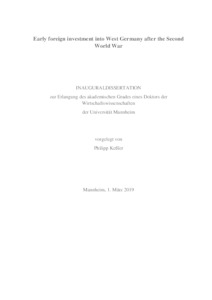|
Early foreign investment into West Germany after the Second World War
Keßler, Philipp
![[img]](https://madoc.bib.uni-mannheim.de/50247/1.hassmallThumbnailVersion/Dissertation_Kessler_Philipp_MADOC.pdf)  Vorschau |
|
PDF
Dissertation_Kessler_Philipp_MADOC.pdf
- Veröffentlichte Version
Download (5MB)
|
|
URL:
|
https://madoc.bib.uni-mannheim.de/50247
|
|
URN:
|
urn:nbn:de:bsz:180-madoc-502479
|
|
Dokumenttyp:
|
Dissertation
|
|
Erscheinungsjahr:
|
2019
|
|
Ort der Veröffentlichung:
|
Mannheim
|
|
Hochschule:
|
Universität Mannheim
|
|
Gutachter:
|
Streb, Jochen
|
|
Datum der mündl. Prüfung:
|
3 Mai 2019
|
|
Sprache der Veröffentlichung:
|
Englisch
|
|
Einrichtung:
|
Fakultät für Rechtswissenschaft und Volkswirtschaftslehre > Wirtschaftsgeschichte (Streb 2011-)
|
|
Fachgebiet:
|
330 Wirtschaft
|
|
Fachklassifikation:
|
JEL:
N14,
N24,
N44,
|
|
Normierte Schlagwörter (SWD):
|
Wirtschaftsgeschichte , Auslandsinvestitionen , Westdeutschland
|
|
Freie Schlagwörter (Deutsch):
|
Wirtschaftsgeschichte , Finanzgeschichte , Sperrmark , Auslandsinvestitionen, Westdeutschland
|
|
Freie Schlagwörter (Englisch):
|
economic history , financial history , blocked accounts , foreign investment , FDI , West Germany
|
|
Abstract:
|
The resumption of foreign investment across Western Europe after the end of the Second World War has so far received little attention in the literature on the post-war European economy. This dissertation studies the important case of foreign investment into West Germany during the early 1950s. Prior to the lifting of the Allied investment embargo in mid-1950, Germany had been isolated from international capital markets for almost two decades, and exchange controls were to remain in place for several more years to come. Under these circumstances, foreign investment was largely restricted to the reinvestment of foreign-owned blocked accounts held at German banks, commonly known as Sperrmark. Chapter One traces the history of Sperrmark and analyses their role as an early post-war, international medium of exchange. On the basis of this historical account, Chapter Two explores the universe of foreign direct investment projects between mid-1950 and early 1955 retrieved from archival sources. The high persistence of investment patterns across the preceding crisis period of the 1930s and the Second World War constitutes the most important finding of this paper: Investors who had already been active in Germany before the War also represented the most prominent group of post-war investors. Moreover, their established presence exerted significant influence on the investment decisions of new post-war entrants. These results are robust to taking into account a range of confounding influences and alternative explanations. Finally, Chapter Three studies the role of the London Debt Agreement of 1953 for contemporaneous foreign investment into West Germany. The settlement of Germany’s outstanding external debt was a necessary condition for restoring the country’s creditworthiness on international capital markets. However, outstanding pre-war indebtedness did not influence post-war foreign investment decisions on a micro-economic level, thus warranting a cautious view on the effects of the Debt Agreement for the West German economy of the time.
|
|
Übersetzter Titel:
|
Frühe Auslandsinvestitionen in Westdeutschland nach dem Zweiten Weltkrieg
(Deutsch)
|
 | Dieser Eintrag ist Teil der Universitätsbibliographie. |
 | Das Dokument wird vom Publikationsserver der Universitätsbibliothek Mannheim bereitgestellt. |
 Suche Autoren in Suche Autoren in
Sie haben einen Fehler gefunden? Teilen Sie uns Ihren Korrekturwunsch bitte hier mit: E-Mail
Actions (login required)
 |
Eintrag anzeigen |
|
|
